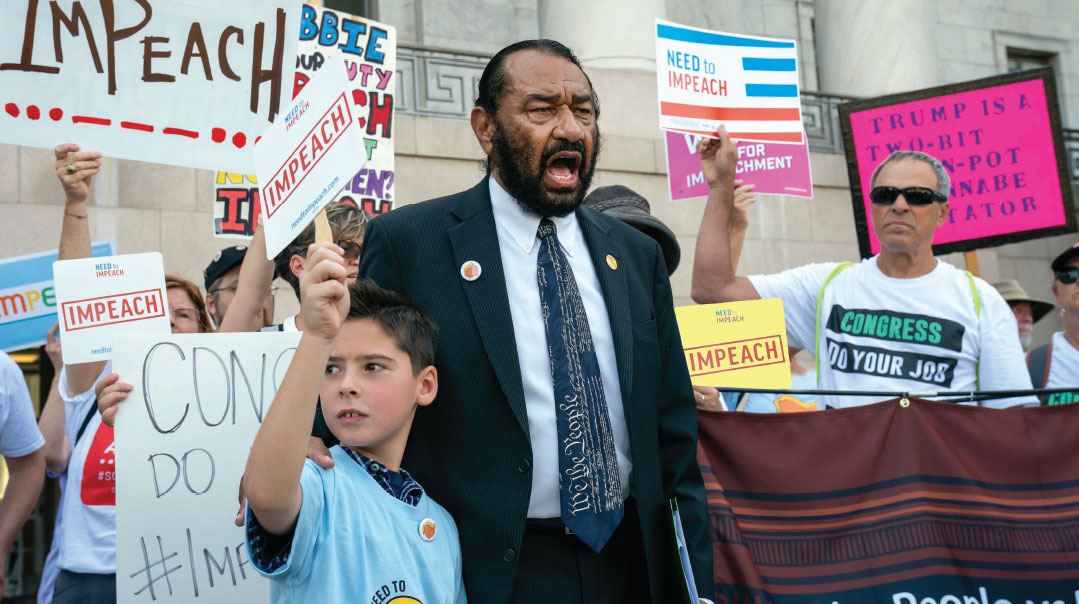High Drama on Capitol Hill

As this national spectacle commences, we decided to take a look at what each side has to gain, or lose, from the process

T
he impeachment proceedings against President Trump, which began this week in the US House of Representatives, are sure to be a circus and a spectacle and a show all wrapped up into one.
All of official Washington, as well as millions of viewers around the world, will watch as congressional Democrats attempt to prove that Donald Trump used his position as president for political gain.
The hearings are likely to last for months, well into the 2020 election season. The irony is, unless something dramatic emerges, it seems that we already know the outcome: impeachment will pass in the House and be rejected by the Senate.
In the meantime, both sides are preparing for an all-out war. Witnesses will take the stand, charges will be made, information will be leaked, and the partisan divide will grow wider. House Republicans will repeat the mantra that the whole process is a sham and a witch-hunt. After all, there was no crime. The “quo” (investigating Hunter Biden, son of former vice president Joe Biden) was never delivered, while the “quid” (American aid) was provided.
On the other hand, the Democrats will argue that the conversation between Trump and Ukrainian President Volodymyr Zelensky represent a classic case of coercion. The president of the United States asked the leader of a foreign country to investigate the son of his political rival. A red line was crossed, and it’s time to take action.
As this national spectacle commences, we decided to take a look at what each side has to gain, or lose, from the process.
Donald Trump
RISK The risk for Trump is clear: The impeachment proceedings will hang over him like a cloud for months. Every day that the media is not talking about the country’s record-low unemployment or the roaring stock market — and instead a brief phone call phone between Trump and the president of Ukraine — is a clear loss for the president.
Trump doesn’t possess nerves of steel, to put it mildly. And instead of ignoring the process and emphasizing his achievements, Trump is hyper-focused on his enemies, posting dozens of angry tweets claiming a “witch-hunt.” Whether or not he’s right, it’s coming to a point where the public is just tired of the endless scandal and drama from the White House.
OPPORTUNITY It’s hard to say that there’s any real opportunity for Trump. If it had been up to him, the impeachment proceedings would have remained a Democratic pipedream. And yet, Trump is sharpest and most focused when he’s facing an enemy, whether that’s Hillary Clinton, a sacked cabinet member, or a business rival.
One year before the 2020 elections, after successfully navigating the Mueller probe, the impeachment proceedings at least give Trump the opportunity to fight for his good name until the bitter end. If he passes this test successfully, it will lend him momentum into 2020.
Democrats
OPPORTUNITY Many pundits believe that impeachment proceedings will enflame the Republican base and only strengthen their commitment to the president. But it’s not so simple. The diehard Democratic base also wants to see its representatives fighting for a worthy cause. Even though impeachment will likely end in failure, Democratic voters want to know that their elected representatives are as committed to bringing down Trump as they are. That fight, in turn, might excite the Democratic base ahead of 2020.
RISK Like the Mueller probe, impeachment may also turn out to be a lot of smoke and no fire. The public doesn’t care who met campaign aide George Papadopoulos, or about the connection between Roger Stone and Julian Assange. The public wants a bottom line. If the bottom line again turns out to be that Democrats are engaged in pure politics, the results could be politically disastrous.
The Republicans
OPPORTUNITY For Republicans, the impeachment proceedings are an opportunity to pause and soberly consider their relationship with Donald Trump. Before Trump’s election, the Republican establishment disavowed him. Respected figures like Sen. John McCain, House Speaker Paul Ryan, Sen. Mitt Romney, and even Sen. Lindsay Graham all agreed that Trump is not a true conservative. Further, they argued that the party was founded around an idea, not a personality.
But then Trump did the unbelievable and won the presidential race. And a candidate who can win is not a candidate you want to replace. But before the whole party rallies behind him ahead of 2020, it’s worth looking at the facts and considering whether lines really have been crossed.
RISK The Republican establishment faces a double risk. Clinging to Trump unconditionally could hurt the party in suburban districts, where Republicans have been losing ground, and turn off independent voters who are pleased by Trump’s management of the economy, but who don’t approve of his character. We already saw a blue wave in the 2018 midterms, and last week, the Democrats scored impressive victories in Kentucky and Virginia.
On the other hand, deserting Trump could backfire in Republican districts where Trump’s base is strong. Despite all the scandals, the tweets, and the controversy, Trump still enjoys a 90 percent approval rating among Republicans.
(Originally featured in Mishpacha, Issue 785)
Oops! We could not locate your form.












